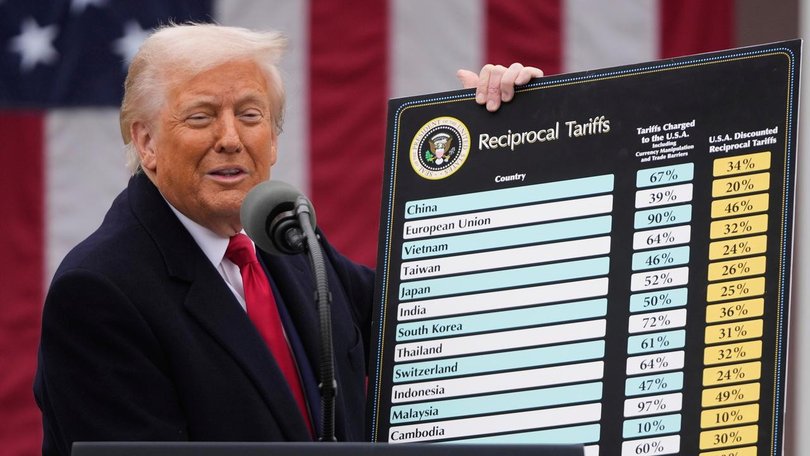US Supreme Court questions legality of Donald Trump's aggressive tariffs
The top court in the United States is weighing the lawfulness of President Donald Trump's sweeping tariffs.

US Supreme Court justices have raised doubts over the legality of President Donald Trump’s sweeping tariffs in a case with implications for the global economy that marks a major test of the president’s powers.
Both conservative and progressive justices sharply questioned the lawyer representing Trump’s Administration about whether the President had intruded on the power of Congress in imposing tariffs under a 1977 law meant for use during emergencies.
But some of the conservative justices also signalled that they were wrestling with their recognition of the inherent power that presidents have in dealing with other countries, suggesting the court could be sharply divided in the outcome of the case.
Sign up to The Nightly's newsletters.
Get the first look at the digital newspaper, curated daily stories and breaking headlines delivered to your inbox.
By continuing you agree to our Terms and Privacy Policy.The court has a 6-3 conservative majority.
During arguments lasting more than two and a half hours, the justices asked US Solicitor General D John Sauer whether Mr Trump’s application of this statute to impose tariffs of unlimited duration was a major action by the executive branch that would require clear congressional authorisation.
Those questions related to the Supreme Court’s “major questions” doctrine, which requires executive branch actions of vast economic and political significance to be clearly authorised by US lawmakers.
The arguments came in appeals pursued by the Administration after lower courts ruled that his unprecedented use of the law at issue to impose the tariffs exceeded his authority.
Businesses affected by the tariffs and 12 US states, most of them Democratic-led, challenged the tariffs.
The tariffs - taxes on imported goods - could add up to trillions of dollars for the United States over the next decade.
Mr Trump has leveraged tariffs as a key economic and foreign policy tool.
Some of the conservative justices also asked pointed questions to the two lawyers arguing against the tariffs - Neal Katyal, representing businesses, and Benjamin Gutman, representing Oregon, one of the states involved in the case.
Mr Sauer kicked off the arguments by defending the legal rationale employed by the president but immediately faced questions raising scepticism over the administration’s arguments about the language and purpose of the statute at issue.
Mr Trump invoked the International Emergency Economic Powers Act (IEEPA) to impose the tariffs on nearly every US trading partner.
The law allows a president to regulate commerce in a national emergency.
Mr Sauer said Mr Trump determined that US trade deficits have brought the country to the brink of an economic and national security catastrophe.
Mr Sauer said imposition of the tariffs has helped Mr Trump negotiate trade deals, and unwinding those agreements “would expose us to ruthless trade retaliation by far more aggressive countries and drive America from strength to failure with ruinous economic and national security consequences”.
The US constitution grants Congress, not the President, the authority to issue taxes and tariffs.
The Administration has argued that IEEPA allows tariffs by authorising the president to “regulate” imports to address emergencies.
The imposition of taxes on US citizens “has always been the core power of Congress,” conservative Chief Justice John Roberts told Mr Sauer, adding that these tariffs seem to be raising revenue, which the constitution contemplates as a role for Congress.
Mr Trump invoked IEEPA in slapping tariffs on goods imported from individual countries to address what he called an emergency related to US trade deficits as well as in February as economic leverage on China, Canada and Mexico to curb the trafficking of the often-abused painkiller fentanyl and illicit drugs into the United States.
Conservative Justice Amy Coney Barrett questioned Sauer about his argument that IEEPA’s language granting presidents emergency power to “regulate importation” encompasses tariffs.
“Can you point to any other place in the code or any other time in history where that phrase together ‘regulate importation’ has been used to confer tariff imposing authority?” Barrett asked.
Mr Trump is the first US President to use IEEPA to impose tariffs.
US Treasury Secretary Scott Bessent said in the lead-up to the arguments that if the Supreme Court rules against Mr Trump’s use of IEEPA, his tariffs are expected to remain in place because the administration would switch to other legal authorities to underpin them.
